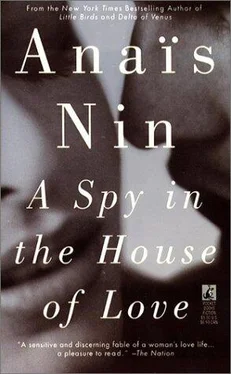The red light changed to green; he gave a wild spurt to his pedaling, so swift that she had no time to step on the curb, then just as wildly he stopped and asked her the way to the beach in a breathless voice which seemed to miss a beat. The voice matched the eyes as his tan, healthy, smooth skin did not.
The tone in which he asked directions was as if the beach were a shelter to which he was speeding away from grave dangers.
He was no handsomer than the other young men she had seen in the place, but his eyes left a memory and stirred in her a wild rebellion against the place. With bitter irony she remembered ruins she had seen in Guatemala, and an American visitor saying: “I hate ruins, I hate dilapidation, tombs.” But this new town at the beach was infinitely more static and more disintegrated than the ancient ruins. The clouds of monotony, uniformity, which hung over the new, neat mansions, the impeccable lawns, the dustless garden furniture. The men and women at the beach, all in one dimension, without any magnetism to bring them together, zombies of civilization, in elegant dress with dead eyes.
Why was she here? Waiting for Alan to end his work, Alan who had promised to come. But the longing for other places kept her awake.
She walked and collided against a sign which read: “This is the site of the most costly church on Long Island.”
She walked. At midnight the town was deserted. Everyone was at home with bottles from which they hoped to extract a gaiety bottled elsewhere.
“It’s the kind of drinking one does at wakes,” thought Sabina, looking into the bars, where limp figures clutched at bottles containing oblivion.
At one o’clock she looked for a drug store to buy sleeping pills. They were closed. She walked. At two o’clock she was worn out but still tormented by a place which refused to have feasts on the street, dances, fireworks, orgies of guitars, marimbas, shouts of delight, tournaments of poetry and courtships.
At three o’clock she swung towards the beach to ask the moon why she had allowed one of her night children to become so lost in a place long ago deprived of human life.
A car stopped beside her, and a very tall, white-haired Irish policeman addressed her courteously.
“Can I give you a lift home?”
“I couldn’t sleep,” said Sabina. “I was looking for a drug store to buy sleeping pills, or aspirin. They’re all closed. I was trying to walk until I felt sleepy…”
“Boy trouble?” he said, his white-haired head very gallantly held with a suave rectitude which did not come from his policeman’s training but from some deeper pride in rectitude itself as the image of man’s erotic pride.
But the words so inadequate that they inhibited whatever she would have liked to confide in him, for fear of another adolescent stunted comment. His appearance of maturity was belied by the clumsy words. So she said vaguely: “I’m homesick for all the beach towns I have known, Capri, Mallorca, the south of France, Venice, the Italian Riviera, South America. “
“I understand that,” he said. “I was homesick when I first came to this country from Ireland.”
“A year ago I was dancing on the beach under palm trees. The music was wild, and the waves washed our feet while we danced.”
“Yes, I know. I was a bodyguard for a rich man. Everybody sat in the port cafes at night. It was like the Fourth of July every night. Come along, I’ll take you to my home. The wife and kids are asleep, but I can give you some aspirin.”
She sat beside him. He continued to recall his life as a bodyguard, when he had traveled all around the world. He controlled the car without a dissonance.
“I hate this town,” she said vehemently.
He had driven smoothly beside a neat white house. He said: “Wait here,” and went into the house.
When he returned he was carrying a glass of water and two aspirin in the palm of his hand. Sabina’s nerves began to untangle. She took the water and aspirin obediently.
He turned his powerful flashlight upon a bush in his garden and said: “Look at this!”
In the night she saw flowers of velvet with black hearts and gold eyes.
“What kind of a flower is that?” she asked, to please him.
“Roses of Sharon,” he said reverently and with the purest of Irish accents. “They only grow in Ireland and on Long Island.”
Sabina’s rebellion was subsiding. She felt a tenderness for the roses of Sharon, for the policeman’s protectiveness, for his effort to find a substitute for tropical flowers, a little beauty in the present night.
“I’ll sleep now,” she said. “You can drop me off at the Penny Cottage.”
“Oh no,” he said, sitting at the wheel. “We’ll drive around by the sea until you’re so sleepy you can’t bear it anymore. You can’t sleep, you know, until you find something to be grateful for, you can never sleep when you’re angry.”
She could not hear very distinctly his long and rambling stories about his life as a bodyguard, except when he said: “There’s two of you giving me trouble with homesickness today. The other was a young fellow in the English Air Corps. Aviator all through the war, seventeen when he volunteered. He’s grounded now, and he can’t take it. He’s restless and keeps speeding and breaking traffic laws. The red lights drive him crazy. When I saw what it was, I stopped giving him tickets. He’s used to airplanes. Being grounded is tough. I know how he feels.”
She felt the mists of sleep rising from the ground, bearing the perfume of roses of Sharon; in the sky shone the eyes of the grounded aviator not yet accustomed to small scales, to shrunken spaces. There were other human beings attempting vast flights, with a kind policeman as tall as the crusaders watching over them with a glass of water and two aspirins; she could sleep now, she could sleep, she could find her bed with his flashlight shining on the keyhole, his car so smoothly so gently rolling away, his white hair saying sleep…
Sabina in the telephone booth. Alan had just said that he was unable to come that day. Sabina felt like sliding down on the floor and sobbing out the loneliness. She wanted to return to New York but he begged her to wait.
There were places which were like ancient tombs in which a day was a century of non-existence. He had said: “Surely you can wait another day. I’ll be there tomorrow. Don’t be unreasonable. “
She could not explain that perfect lawns, costly churches, new cement and fresh paint can make a vast tomb without stone gods to admire, without jewels, or urns full of food for the dead, without hieroglyphs to decipher.
Telephone wires only carried literal messages, never the subterranean cries of distress, of desperation. Like telegrams they delivered only final and finite blows: arrivals, departures, births and deaths, but no room for fantasies such as: Long Island is a tomb, and one more day in it would bring on suffocation. Aspirin, Irish policemen, and roses of Sharon were too gentle a cure for suffocation.
Grounded. Just before she slid down to the floor, the bottom of the telephone cabin, the bottom of her loneliness, she saw the grounded aviator waiting to use the telephone. When she came out of the booth he looked distressed again as he seemed to be by everything that happened in time of peace. But he smiled when he recognized her, saying: “You told me the way to the beach.”
“You found it? You liked it?”
“A little flat for my taste. I like rocks and palm trees. Got used to them in India, during the war.”
War as an abstraction had not yet penetrated Sabina’s consciousness. She was like the communion seekers who received religion only in the form of a wafer on the tongue. War as a wafer placed on her tongue directly by the young aviator came suddenly very close to her, and she saw that if he shared with her his contempt for the placidities of peace it was only to take her straight into the infernal core of war. That was his world. When he said: “Get your bicycle then, and I’ll show you a better beach further on…” it was not only to escape from fashionable reclining figures on the beach, from golf players and human barnacles glued to damp bar flanks, it was to bicycle into his inferno. As soon as they started to walk along the beach, he began to talk:
Читать дальше












